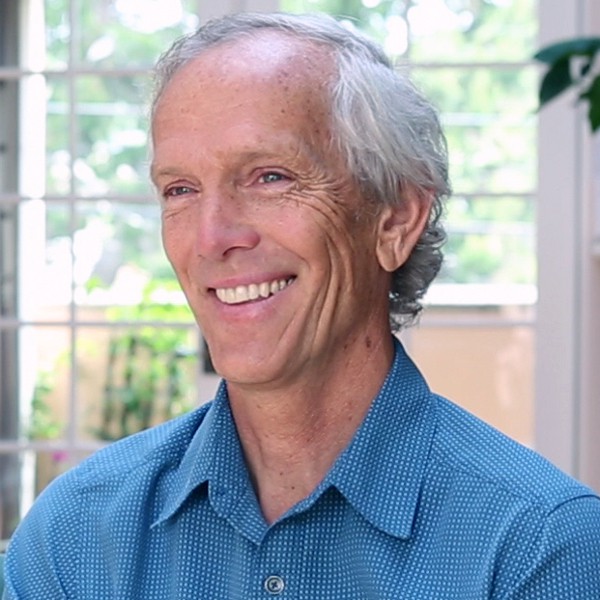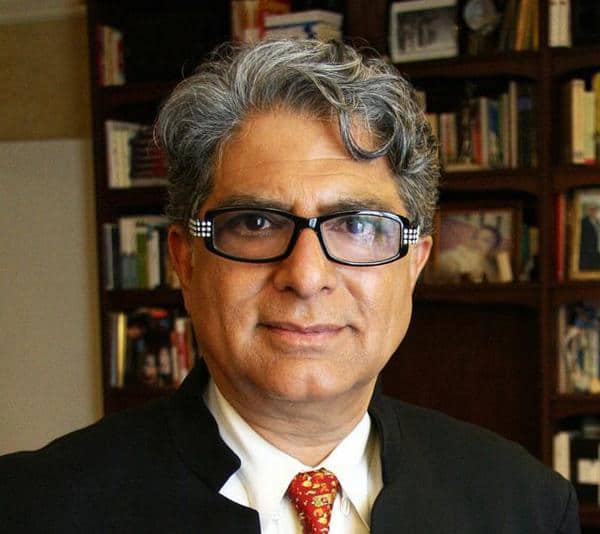The art of being human is that maintaining happiness and well-being is difficult. We are too complex for a cut-and-dried answer to work. There have been broad trends, however, over the course of time. Devotion to God, the pursuit of reason, getting rich, going to a therapist—all the possible avenues for achieving happiness have been explored, and in modern society each solution remains open. No one is locked into another person’s way to find happiness.
But that’s not the same as claiming that all of these various approaches have worked—there is a good possibility, in fact, that none has. That’s the position taken by a wide swath of teachers and guides, most of them classified as “spiritual,” who declare that living in the state of separation is the root cause of suffering. Separation is also known as duality, and so in recent years a new rubric, nondualism, has been used to embrace philosophers, therapists, spiritual teachers, and general writers who promote wholeness as the secret of true, lasting well-being.

In this article we’ll look at the nondual argument through an overview of how things stand in the well-being movement and the biomedical literature.
Regarding the biomedical literature, at present a significant gap exists on the subject of consciousness, nondual awareness, and well-being. The benefits of techniques to foster nondual awareness, such as meditation, are now widely studied, however, typically only as a means to overcome stress and promote relaxation without drawing attention to the transcendent aspects of the individual.
Research into nondual awareness can address a missing component of well-being in the psychologic and psychiatric literature. In the foreword to Mystery of the Mind” by Swami Muktananda, Swami Durgananda writes “Up until now, the great body of literature documenting this state [of nonduality] isn’t in psychology. But just as with modern psychology, the millennial-old spiritual paths of the East also viewed ‘understanding ourselves and others as largely a matter of understanding our own minds,’ rather than blaming our dissatisfaction on external forces.”1
Still essential distinctions exist between science’s understanding of well-being and the state of awareness known as nonduality. Nonduality—a term coined to describe what the experience is not—can perhaps be more appropriately described as oneness. It is in essence a state of being, knowing, and perception, that all that exists is one.
The ancient Hindu text, Yoga Vasishtha, characterizes nonduality as a “continuous and unbroken awareness of the indwelling presence, inner light or Consciousness.” There is only Consciousness appearing as this or that. In this regard, knowledge of Self is knowledge of one’s “true identity,” as distinct from ordinary self-consciousness, which fosters a sense of feeling different and separate.
Neuroscientist Zoran Josipovic describes nondual awareness as “an open, awake cognizance that precedes conceptualization and intention, and contextualizes and unifies both extrinsic task-positive and intrinsic self-referential mental processes, without fragmenting the field of experience into opposing dualities.”2, 3
 Nonduality is also sometimes called non-separation. Most individuals identify with the body as self and experience themselves as residing in the body. They look out at the world as separate from themselves. This is the experience of separation, duality. In nondual awareness, there is no distinction between the perceiver and what is perceived; between the knower and the known. There is no, ‘I’m here in the body and everything else is out there’, but rather everything is known and experienced to be one. There is no separation from Self and what is being experienced. It’s literally all the same. Any prior experience of individual identity is now the experience of the Self in its multitude of expression. The ‘person’ identifies not as an individual but as the Self (or Universal Awareness), and in this sense nondual awareness is a fulfillment of ‘Know Thyself’, an aphorism of many great ancient cultures. Ultimately, terms such as non-separation and unity are less fitting as they implicitly refer to a situation where what was once separate is no longer separate whereas in Consciousness this is not possible as there is nothing that is that is not of that oneness.
Nonduality is also sometimes called non-separation. Most individuals identify with the body as self and experience themselves as residing in the body. They look out at the world as separate from themselves. This is the experience of separation, duality. In nondual awareness, there is no distinction between the perceiver and what is perceived; between the knower and the known. There is no, ‘I’m here in the body and everything else is out there’, but rather everything is known and experienced to be one. There is no separation from Self and what is being experienced. It’s literally all the same. Any prior experience of individual identity is now the experience of the Self in its multitude of expression. The ‘person’ identifies not as an individual but as the Self (or Universal Awareness), and in this sense nondual awareness is a fulfillment of ‘Know Thyself’, an aphorism of many great ancient cultures. Ultimately, terms such as non-separation and unity are less fitting as they implicitly refer to a situation where what was once separate is no longer separate whereas in Consciousness this is not possible as there is nothing that is that is not of that oneness.
While psychology and nondual thought share the aim of alleviating human suffering perpetuated by the mind, the focus is limited to the mind itself, without an understanding of Awareness beyond mind, which would represent a significant shift in the understanding of well-being. More often than not, well-being is discussed in terms of the hedonic and eudaimonic approaches to well-being. The hedonic approach is mainly characterized by the ongoing seeking of pleasurable experiences (pursuing happiness) and the avoidance of painful experiences, whereas the eudaimonic approach seeks personal fulfillment not by pursuing pleasure per se but by realizing one’s own potential.
More recently, the psychological and psychiatric literature have embraced “positive psychology” (sometimes called “positive psychiatry,” although something of an oxymoron) to describe the significant contribution of factors such as gratitude, compassion and empathy to well-being. The Journal of Positive Psychology was launched in 2006 while the Journal of Positive Psychology and Well-being launched in 2017, to specifically address how attributes of positive psychology support well-being. The journal is “devoted to basic research and professional application on states of optimal human functioning and fulfillment and the facilitation and promotion of well-being.” While there are no journals devoted to positive psychiatry, the book Positive Psychiatry: A Clinical Handbook was published in 2015 in order to initiate this dialogue. Even within the field of Behavioral Cardiology, which since its origins over five decades ago focused on the effects of ‘negative’ traits such as stress, depression, and anxiety on cardiac outcomes, has shifted to an appreciation of the value of gratitude and empathy to improve long-term outcomes and well-being in cardiac patients. Such efforts have significantly broadened our understanding of what it takes to cultivate and maintain well-being, which previously was more limited to a focus on domains such as career, social, financial, physical, and community.4
The question remains, keeping in mind an understanding of the importance of these factors, to what degree does cultivating nondual awareness provide a further foundation to well-being?
Since the early 1970s, the scientific literature on meditation has grown significantly, with today approximately 4,700 citations appearing on the biomedical database PubMed.gov. While a majority of meditation practices share the common ultimate aim of transcending ego self-identification towards establishing a more unified life of nonduality, there is little evidence of this in the biomedical literature.5, 2 In addition to meditation, other common approaches to gaining insight into nondual awareness and spiritual awakening include self-inquiry, prayer, and psychedelics.
 As the meditation movement picked up steam, the field of Transpersonal Psychology was founded in an attempt to integrate the emerging understanding of the transcendent aspects of the human experience within the framework of modern psychology. Transpersonal refers to any experience where the sense of identity or self extends beyond the individual or personal to encompass wider aspects of humankind, life, psyche or cosmos.6 While for any individual’s spiritual journey there are likely many transpersonal experiences, such experiences may or may not include an experience of nondual awareness.7, 8 That is, while nondual awareness can be considered a transpersonal state, transpersonal states may not necessarily include nondual awareness. Therapists working in Transpersonal Psychology seek to help individuals with spiritual self-development, mystical experiences, altered states of consciousness, understanding self beyond the ego, and how to integrate those experiences into everyday life.6 These are significant contributions as there are more often than not challenges for an individual to understand and adjust to changes (and loss) of sense of self and personhood along the spiritual journey.
As the meditation movement picked up steam, the field of Transpersonal Psychology was founded in an attempt to integrate the emerging understanding of the transcendent aspects of the human experience within the framework of modern psychology. Transpersonal refers to any experience where the sense of identity or self extends beyond the individual or personal to encompass wider aspects of humankind, life, psyche or cosmos.6 While for any individual’s spiritual journey there are likely many transpersonal experiences, such experiences may or may not include an experience of nondual awareness.7, 8 That is, while nondual awareness can be considered a transpersonal state, transpersonal states may not necessarily include nondual awareness. Therapists working in Transpersonal Psychology seek to help individuals with spiritual self-development, mystical experiences, altered states of consciousness, understanding self beyond the ego, and how to integrate those experiences into everyday life.6 These are significant contributions as there are more often than not challenges for an individual to understand and adjust to changes (and loss) of sense of self and personhood along the spiritual journey.
A permanent residing in nondual awareness can be considered a penultimate transpersonal experience because the prerequisite for it is the loss of what had been experienced as an individual identify, which was responsible for the experience of duality in the first place. In the nondual state, the limited self-identity as a personal state has been transcended and recognized to have been merely an impermanent pattern in the space (field) of nondual awareness (fundamental consciousness). The gap of separation from Self no longer exists, breaking prior patterns of dependence on external sources for the experience of wholeness.
For someone in a state of nondual awareness, the knower, the known, and the process of knowing are experienced as one. Well-being then is not based on an object or another person, but truly autonomous in the fullest sense of the word. From a (clinical) psychological point of view, it should be noted that nondual awareness is not a panacea in terms of providing immunity from experiencing day-to-day life’s challenges, nor a guarantee of emotional maturity and development.
Despite the central importance of nondual awareness for human well-being, it has been largely overlooked in Western clinical psychology and psychiatry, hence its absence in the biomedical literature. For reasons that are understandable, but nonetheless unfortunate, the meditation literature emphasizes the value of meditative techniques for the purpose of promoting relaxation and increasing mindfulness, and not drawing attention to the transcendent aspects of the individual and the practices potential to cultivate a life therein. It’s been pointed out in the literature that “it is not clear whether secular mindfulness-based approaches could enable a progression beyond initial stages of modes of existential awareness” as loss of subject-object duality are rarely emphasized in meditation as taught by clinical psychologists.9 Some of the psychotherapeutic meditative techniques do, however, focus on training earlier phases or modes of existential awareness9 such as nonattachment10, 11, decentering12, 13, and self-awareness and regulation.9, 11
 It’s not as if this knowledge is unavailable. Many of the meditative traditions and philosophies, such as Advaita Vedanta, Kashmir Shaivism, Buddhism, Taoism, Sufism and mystical Christianity share the foundational understanding that the Self is absolute and unitary. Fascinating newer developments in neuroscience seek to understand neural mechanisms of nondual awareness as compared to those of focused attention, open monitoring, and mind wandering, as well as seeking to understand the effects of nondual awareness on cognitive and affective processes which are hypothesized to be related to changes in fragmented subject vs. object experience.3, 2
It’s not as if this knowledge is unavailable. Many of the meditative traditions and philosophies, such as Advaita Vedanta, Kashmir Shaivism, Buddhism, Taoism, Sufism and mystical Christianity share the foundational understanding that the Self is absolute and unitary. Fascinating newer developments in neuroscience seek to understand neural mechanisms of nondual awareness as compared to those of focused attention, open monitoring, and mind wandering, as well as seeking to understand the effects of nondual awareness on cognitive and affective processes which are hypothesized to be related to changes in fragmented subject vs. object experience.3, 2
A caveat with pursuing nondual awareness as a foundation of well-being is that, while it is attainable, it is less readily cultivated than, say, learning habits of gratitude or practicing breathing techniques or meditation as means to foster relaxation and well-being. While there are many paths to developing nondual awareness, it’s not evident which might be more or less conducive to success.
In summary, the journey to nondual awareness is the journey to establishing a true well-being. Bringing greater attention to this in the biomedical literature can help further advance our understanding of the human being and of our potential for developing extraordinary well-being.
REFERENCES
- Venkatesananda S. The Supreme Yoga: Yoga Vasishtha. Motilal Banarsidass, Delhi. 2010.
- Josipovic Z. Freedom of the mind. Front Psychol. 2013;4:538.
- Josipovic Z. Neural correlates of nondual awareness in meditation. Ann N Y Acad Sci. 2014;1307:9-18.
- Diener E, Tay L. Subjective well-being and human welfare around the world as reflected in the Gallup World Poll. Int J Psychol. 2015;50(2):135-149.
- Baerentsen KB, Stodkilde-Jorgensen H, Sommerlund B, et al. An investigation of brain processes supporting meditation. Cogn Process. 2010;11(1):57-84.
- Kasprow MC, Scotton BW. A review of transpersonal theory and its application to the practice of psychotherapy. J Psychother Pract Res. <1999;8(1):12-23.
- Strobbe S, Cranford JA, Wojnar M, Brower KJ. Spiritual awakening predicts improved drinking outcomes in a Polish treatment sample. J Addict Nurs. 2013;24(4):209-216.
- Miller L. Spiritual awakening and depression in adolescents: a unified pathway or “two sides of the same coin.” Bull Menninger Clin. 2013;77(4):332-348.
- Dorjee D. Defining Contemplative Science: The Metacognitive Self-Regulatory Capacity of the Mind, Context of Meditation Practice and Modes of Existential Awareness. Front Psychol. 2016;7:1788.
- Barnes S, Brown KW, Krusemark E, Campbell WK, Rogge RD. The role of mindfulness in romantic relationship satisfaction and responses to relationship stress. J Marital Fam Ther. 2007;33(4):482-500.
- Holzel BK, Lazar SW, Gard T, Schuman-Olivier Z, Vago DR, Ott U. How Does Mindfulness Meditation Work? Proposing Mechanisms of Action From a Conceptual and Neural Perspective. Perspect Psychol Sci. 2011;6(6):537-559.
- Walsh E, Eisenlohr-Moul T, Baer R. Brief mindfulness training reduces salivary IL-6 and TNF-alpha in young women with depressive symptomatology. J Consult Clin Psychol. 2016;84(10):887-897.
- Shapiro SL, Carlson LE, Astin JA, Freedman B. Mechanisms of mindfulness. J Clin Psychol. 2006;62(3):373-386.
Learn More About the Authors

Paul J. Mills, PhD, is a Professor of Family Medicine and Public Health and Director of the Center of Excellence for Research and Training in Integrative Health at the University of California, San Diego. He is a long-standing National Institutes of Health (NIH)-supported clinical investigator with expertise in psychoneuroimmune processes in wellness and in disease, with a current focus on integrative and behavioral medicine. He has been active in the fields of complementary and integrative medicine, conducting some of the earliest studies on the physiology of meditation in the late 1970s.

Deepak Chopra, MD, FACP, founder of The Chopra Foundation and co-founder of The Chopra Center for Wellbeing, is a world-renowned pioneer in integrative medicine and personal transformation, and is Board Certified in Internal Medicine, Endocrinology and Metabolism. He is a Fellow of the American College of Physicians and a member of the American Association of Clinical Endocrinologists. Chopra is the author of more than 80 books translated into over 43 languages, including numerous New York Times bestsellers. His latest books are The Healing Self co-authored with Rudy Tanzi, PhD, and Quantum Healing (Revised and Updated): Exploring the Frontiers of Mind/Body Medicine. www.deepakchopra.com


Absent in this discussion is mention of compassion for others and for multifarious life. It’s still all about how to achieve a state of equanimity and personal peace. Where is mention of legitimate pain when we see the suffering of creatures other than ourselves? How can we integrate that into a state of nonduality—without taking that suffering into ourselves? Do we just turn away from this aspect of the external world? And if we include it, our own state of wellbeing must necessarily be disturbed. It seems to me there are higher states than nonduality if nonduality is used merely to attain a personal wellbeing.
I wish the turmoil and anguish of the world had been addressed in this article. After all, if we are nondual, that anguish must be part of us.
Great article- but non dual Awareness is not so difficult once you recognize the Omnipresence of God. The space in which we move & have our Being is not empty. Think about the awesomeness of one breath breathing all! The light that twinkles in all the eyes. The trick is to recognize He resides in all & greet everyone as such silently. There is a great book – that shows the way- “ Practicing The Presence” by Joel Goldsmith. One of the best written written by a Westener. Then of course there is Sathya Sai Baba who explains it quite clearly! Sai Ram!
I was with you until Sai Baba. How do people not see that he was a broken magic act? A charlatan and possibly disturbed being. Could not be further from a simple, humble, Realized Sage. Such as Ramana for example. India and now the world are inundated with business Gurus. It truly is an age of spiritual decline.